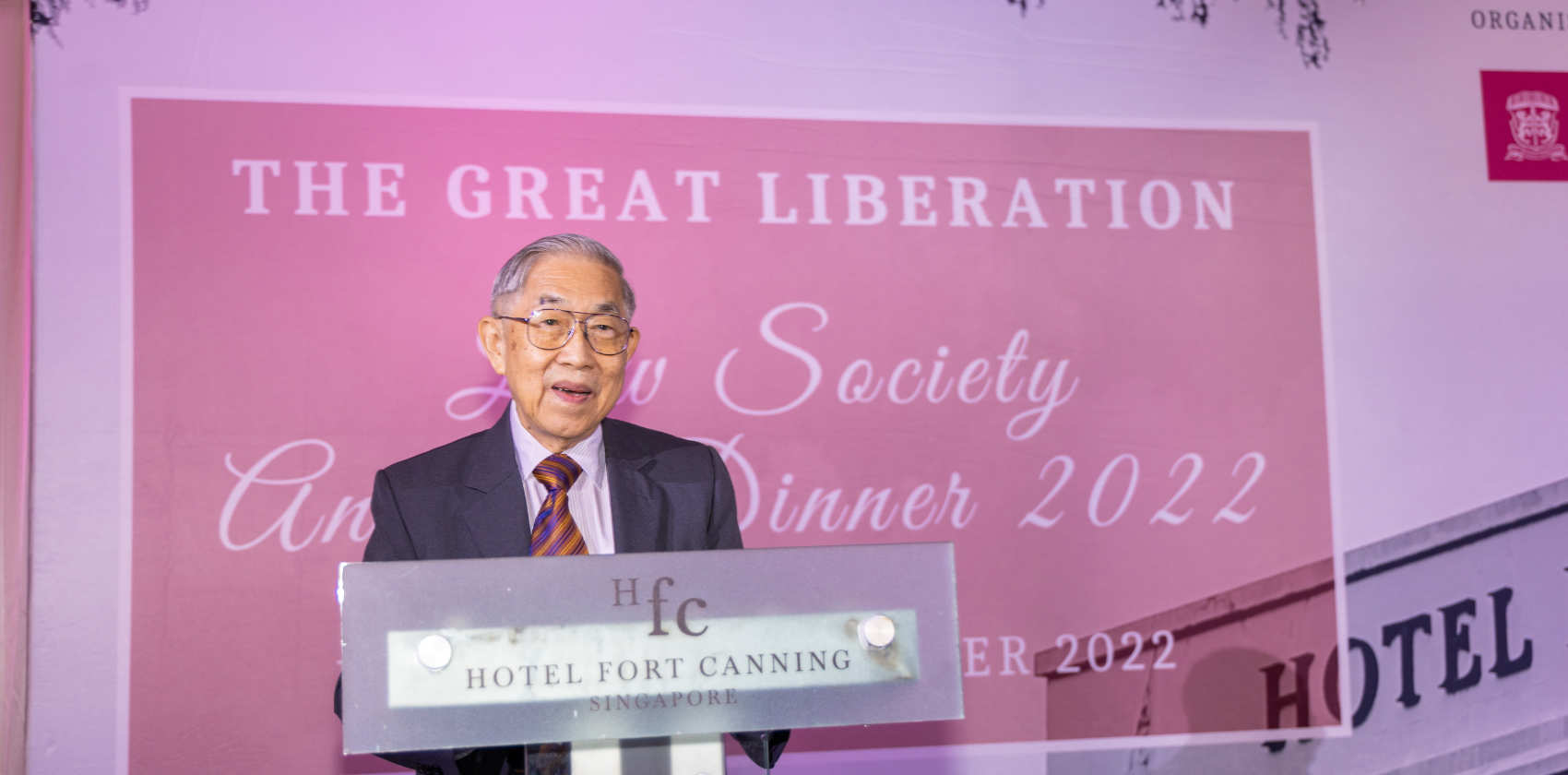
Honorary Member of the Law Society Mr Chao Hick Tin
Mr Chao Hick Tin was conferred honorary membership of the Law Society at the Society’s annual dinner on 18 November 2022. Here we present the citation read by President Adrian Tan, Mr Chao’s acceptance speech, as well as tributes from past Presidents of the Law Society.
Citation

President Adrian Tan with Mr Chao Hick Tin
On behalf of the Law Society, I am privileged to announce by this citation that Mr Chao Hick Tin has been elected as an Honorary Member. He joins a distinguished fraternity which includes the late Minister Mentor, and a select band of Judges, diplomats and lawyers.
Mr Chao obtained his Bachelor of Laws and Master of Laws from University College, London in 1965 and 1966 respectively. He was called to the English Bar in 1965 and admitted as an advocate and solicitor in Singapore in 1971. In 2013, he was elected as a Bencher of Middle Temple.
Mr Chao spent more than five decades in the public service. He began his career as a State Counsel in the Attorney-General’s Chambers in 1967 and rose to the position of Senior State Counsel in 1979. He joined the Supreme Court as a Judicial Commissioner in 1987 and was appointed a High Court Judge in 1990. He was subsequently elevated to a Judge of Appeal in 1999.
In 2006, he was appointed the 4th Attorney-General of Singapore and was appointed Senior Counsel in 2007. As Attorney-General, he was part of the Singapore team which argued the case for Singapore before the International Court of Justice at The Hague in relation to the territorial dispute with Malaysia concerning Pedra Branca. For his service in relation to that case, he was conferred the Distinguished Service Order in the National Day Awards of 2008.
Mr Chao returned to the Supreme Court in 2008 as a Judge of Appeal and Vice-President of the Court of Appeal, a position he held until his retirement on 28 September 2017.
During his judicial tenure, Mr Chao also served as the Vice-President of the Singapore Academy of Law and Chairman of SAL’s Corporate Development and Services Cluster. In addition, he was President of the Industrial Arbitration Court from 1993 to 1999, Chairman of the Singapore Mediation Centre from June 2003 to May 2006, and President of the ASEAN Law Association from December 2003 to November 2006.
After his retirement, Mr Chao continued to serve as a Senior Judge of the Supreme Court on an adjunct basis, sitting in the Court of Appeal. He is also serving as Chairman of the Presidential Council for Religious Harmony and Chairman of the Singapore Chamber of Maritime Arbitration. In June this year, he stepped down as a Senior Judge on being appointed a Member of the Council of Presidential Advisers.
The award of this Honorary Membership is a fitting recognition for the extraordinary contribution that Mr Chao has made as a judge and public servant for over five decades.
Acceptance Speech
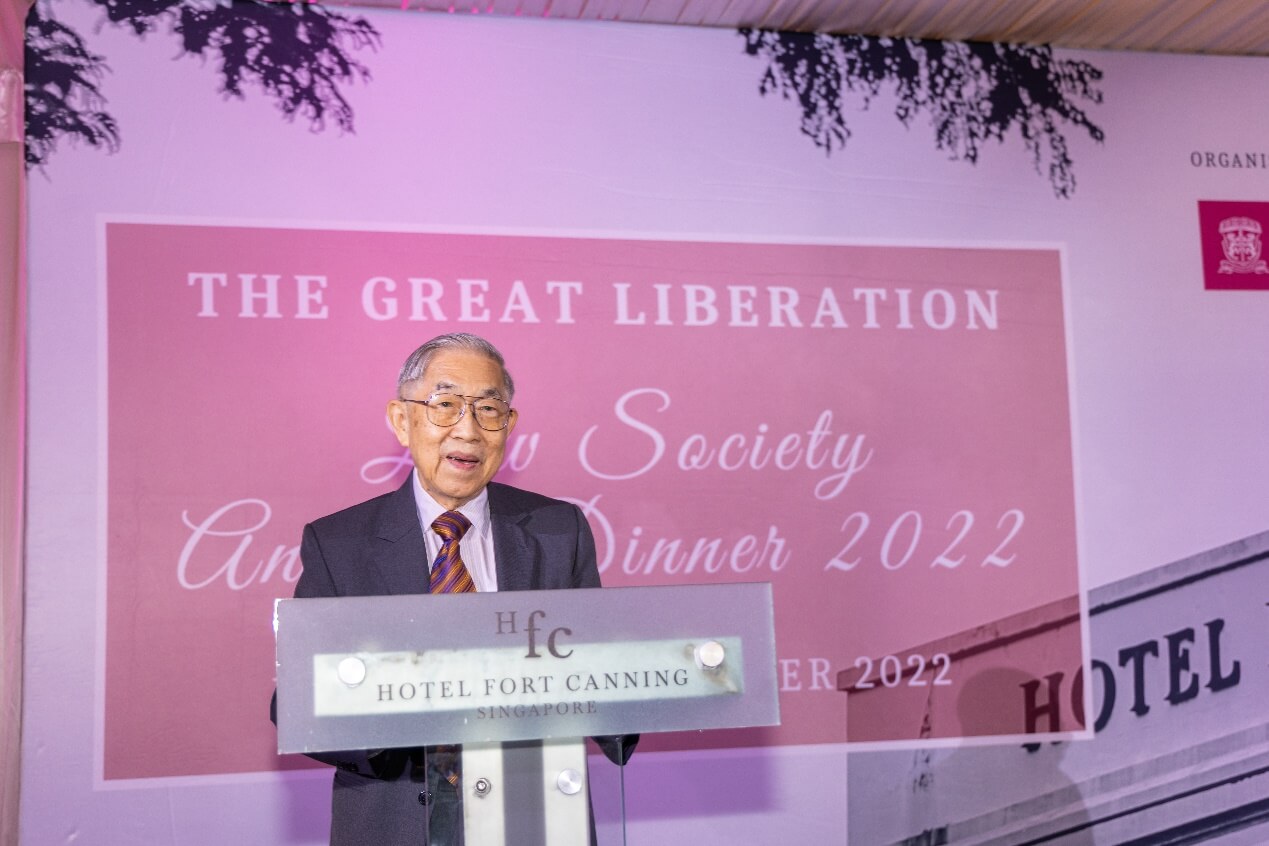
Mr Chao Hick Tin giving his acceptance speech
The President of the Law Society, Mr Adrian Tan, thank you. Honourable Judges of the Supreme Court, distinguished guests, ladies and gentlemen. Good evening. It is so wonderful to see everyone in a gathering like this.
It is very kind and gracious of the Council of the Law Society to bestow on me this honour. This is an honour which came to me like a bolt from the blue, though a very pleasant bolt indeed. Since my retirement from fulltime appointment on the Bench at the end of September 2017, what I have encountered have been kindness, warmth and generosity. I am overwhelmed and am grateful beyond words. I also wish to thank and praise the Lord for guiding me the whole of my working life.
On an occasion like this, and bearing in mind that I am reaching the end of my legal career, and will be disappearing into the sunset, you will forgive me if I should become a little nostalgic. As some of you may know, my sojourn into the law was not accidental. From a young age, the equivalent of what is now Secondary III, I had more or less made up my mind to do law. This was on account of the cases I read in the newspapers. Sometimes I would wonder why the decision was that way or why was the sentence so harsh or lenient. Each of our journeys into the law would naturally be different. Some lawyers have told me that they have embarked on a legal career entirely by coincidence or accident but never regretting it. This shows that an interest in the law can be acquired upon starting your course or your practice in law. Over the years I have also spoken to many A level students who posed to me this question – “should I do law”? My answer has always been “follow your heart”. I would tell them first ask yourself what subject or area really interests you. If you have an interest in anatomy or dissection, then you should consider biology or medicine. Similarly if the economy of the country is something that excites you, economics should be your chosen field. If you like to learn more about the past, then one should perhaps take up history. Often the answers I got from the students were this, “I really do not know what I would like to do”. They would sometimes add, “father would like me to do medicine”, etc. At that point I would do a pitch for Law, saying to them that doing law did not mean you had to practise law. You could go into other fields. I told them that based on my own understanding from people in the HR field, doing Law would be a good option from the point of view of obtaining employment. Those people indicated to me that, everything being equal, a candidate with a Law degree would more likely have a better chance of being selected. Their reason was this. A Law education would give a student a better training in critical analysis. Furthermore, his knowledge or sense of the law could help the employer avoid some obvious pitfalls.
My career has entirely been with the public sector. I have been asked, especially in my earlier years, why did I not give myself a stint in private practice, so that I could have a more rounded experience. In fact, I started as a pupil with an established law firm. I was open to the idea of being in private practice. I would have become a member of the Law Society if not for the fact that, through various conversations with some senior lawyers at the time, they advised me that it would be good to gain some experience as a Legal Officer in AGC and/or as a Magistrate. They said after that, I could then move on to the private sector. That influenced me in deciding to apply for the Legal Service which I joined in 1967. In my fifth year in Service, something happened which could have changed my career path. I was approached by someone to join his firm. The then AG came to know of it even though I had not yet made up my mind. He persuaded me to stay. The rest, as the saying goes, is history. There is perhaps something you might not know relating to the Legal Service then. Up to about 1974, the system in place was the post system. In other words, there was a fixed and limited number of promotional posts. A pyramid kind of structure. An officer could only be promoted if the person above him got promoted to an even higher grade or had resigned. That opening would then be competed for by several people who were in the same grade below. Now the system is entirely different. An officer is promoted entirely on his/her own merits. There are no other constraints.
Those of you who have joined the profession in the last 35 or more years would have realised the great impact which technology has had on the profession. In addition, the Judiciary has also made reforms to its processes to enhance efficiency. So when you compare the pace of legal practice in the first half of the eighties with the present day, the change is monumental. At that time, and of course earlier, things moved slower. When you go overseas for a vacation, you need not think about work. No one would be able to disturb you. Now, no matter where you are, you will be on call 24/7. Documents then were shorter, whether it was a pleading, an affidavit or a judgment; so were letters. The traditional typewriters were in use then. With every amendment your secretary would need to retype the entire document. Can you imagine retyping a 30-page judgment or contract. Retyping the draft a second time might still be fine. Any more and your secretary would be most unhappy. So if you were to look at some original judgments of that era, you may find hand written amendments on it. In the present day, having 10 drafts of a document is nothing unusual. Technology has facilitated our work. You are now also enjoying the help which technology has offered you in relation to legal research. Back then, legal research was a laborious task. It involved going through text books or Mallal’s Digest, obtaining the relevant cases and citation, browsing through physical reports and getting the relevant passages to cite to the Court. Now online research is a breeze. The consequence of this is that submissions made by parties to the Court is invariably more extensive, with cases being cited at almost every turn. A further consequence is that judgments and GDs are becoming longer in length and I would say also more learned. This may not be a bad thing in relation to developing the law as jurisprudence will thereby be enriched. Those of you who have had the occasions to refer to Singapore cases decided during the colonial days and during the two decades post our independence, and reported in the MLJ, would have noticed that judgments/GDs then were generally briefer with fewer cases being cited. The only complaint I have heard in connection with this development of judgments being lengthy came from the busy legal practitioners who moaned that it is taking a much longer time to digest a judgment and get to the gist of the decision.
A much talked-about word of the eighties was backlog. That is no longer an issue which troubles the Judiciary now. As I mentioned earlier, reforms to court processes had taken place to make the processes more efficient. Significant enhancement to the manpower of the Bench has also been made. When I first joined the Bench in 1987, the entire Bench consisted of only nine judges, myself included. Today there are some 29 judges and that does not include the Senior Judges and the International Judges. The Bench has never been so strong before. Some of the best legal brains are on the Bench. This may be considered to be a golden era of our Judiciary. I have every confidence that our Judiciary will continue to make notable contributions to the development of the law in general. To enable the Bench to achieve that, a good and strong Bar is critical and indispensable. This will be the Bar’s contribution.
The prospects ahead for the legal profession have never been brighter. Our Supreme Court has successfully launched the Singapore International Commercial Court. Its caseload has increased over the years. Some of the most respected judges from across the globe are now serving on the SICC. As regards arbitration, the SIAC is now firmly established as a leading global arbitration centre. As regards maritime disputes, there is the Singapore Chamber of Maritime Arbitration which provides unique unadministered and low costs arbitration services which are preferred by the global maritime community. Indeed, the coming into being of SCMA was in response to the clamour of the maritime community. Queen Mary Arbitration Survey 2021 had ranked Singapore alongside London as the world most preferred arbitral seat. On the subject of mediation, the Singapore Judiciary has whole-heartedly embraced it as being complementary to its adjudication process, so that a win-win solution could be found for as many cases as possible. On the international plane, Singapore had actively supported the adoption of a convention on mediation which was eventually opened for signature three years ago and that Convention now bears Singapore’s name. It is clear that Singapore has become a dispute resolution hub for the region, if not for the world. This augurs well for members of the Singapore Bar, who will undoubtedly seize the opportunities and demonstrate their expertise and agility in dispute resolution.
For me, the 55 years which I have spent in the Public Service, including the period as Senior Judge, had been a most enriching, exciting and rewarding journey, even though it was not a journey without difficulties. I have been asked if I were to relive my life all over again, would I have chosen the same path, my answer is an unhesitating yes. For those of you who are still in your thirties, forties or fifties, I would just say that time passes faster than you think. I still remember the first day I reported for work at AGC on 1 June 1967. I am deeply grateful to have the opportunity to serve in the Singapore Judiciary where I came into contact with so many of you professionally. Indeed, in some ways, I had learned from your submissions before me. The road ahead for you in the next 20, 30 years will be even more challenging than the last 20, 30 years. As the world has become a village, legal practice is no longer territorial. You need to go international. I am confident that you will be able to meet the challenge by observing two essential qualities: hard work and never compromise on integrity at any time.
In closing, may I again thank the Council of the Law Society for bestowing upon me this honour for which I am immensely grateful. May I also wish every member of the Law Society that he or she will find satisfaction and success in his or her pursuits.
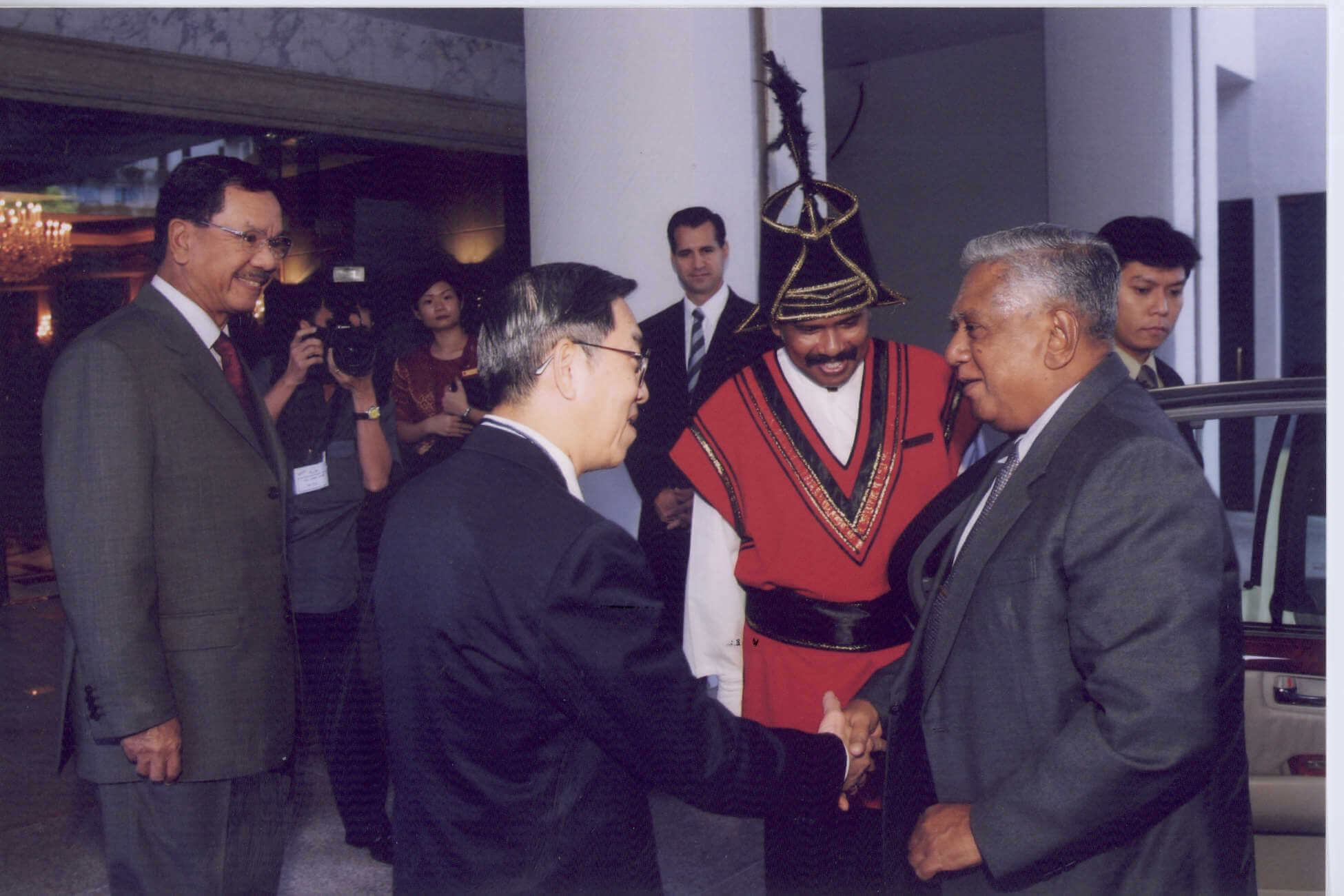
Mr Chao with President SR Nathan in 2003
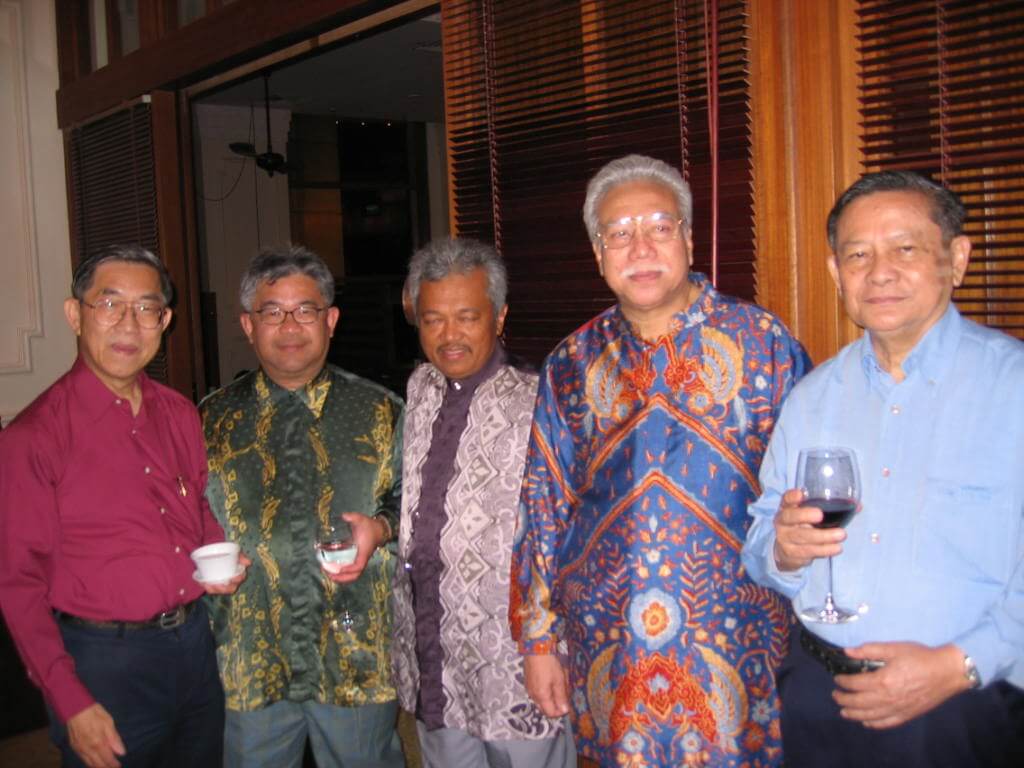
Mr Chao at the Asean Law Association conference in 2005 with delegates from Brunei, Indonesia and Malaysia
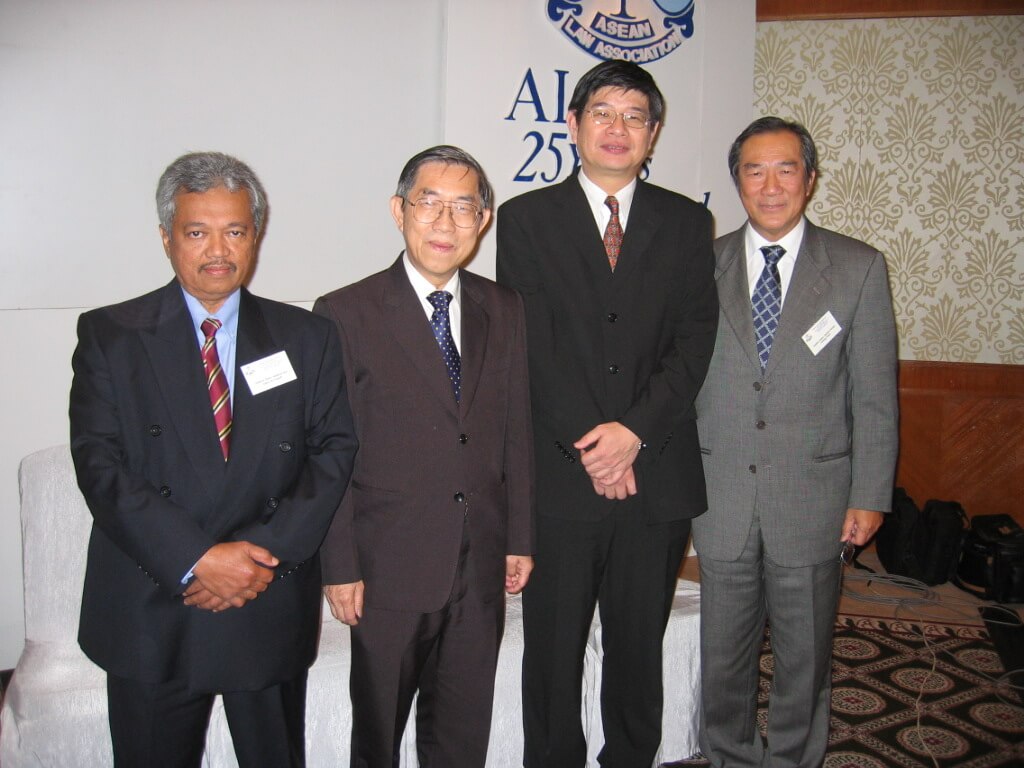
With the secretary-general of ALA and judges of Malaysia
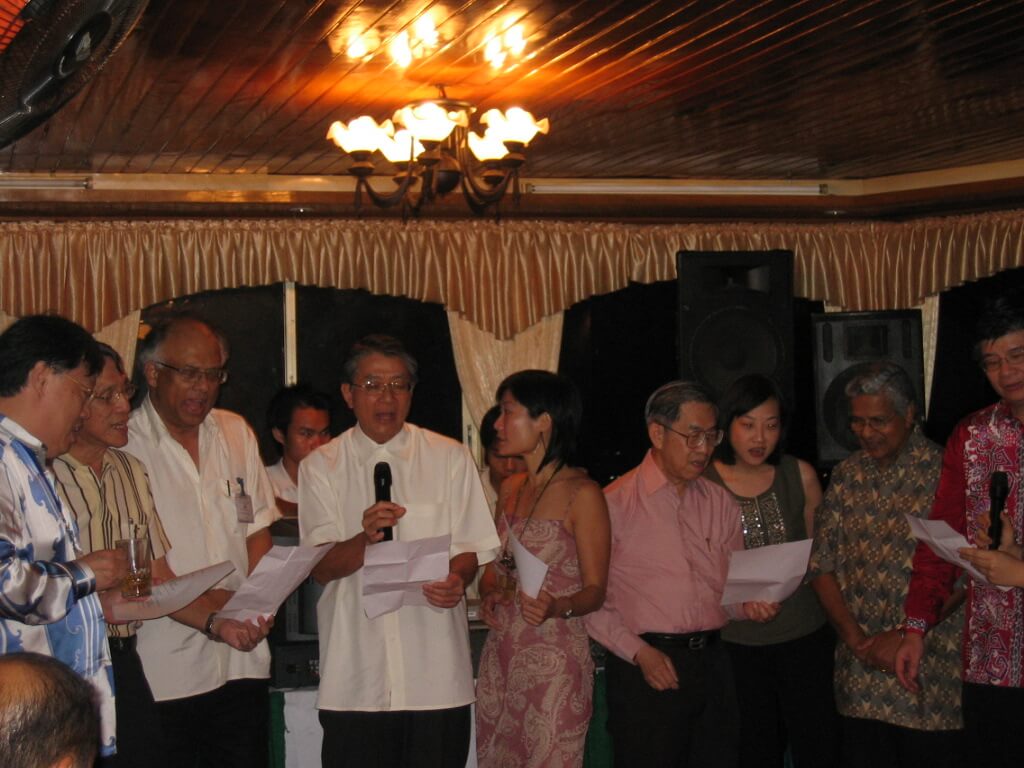
Joining other lawyers in song in 2006
Photos: courtesy of Mr Chao Hick Tin
Tributes from Past Presidents of the Law Society
Having served with distinction over five decades in the Singapore public service – as a Legal Service Officer in the Attorney-General’s Chambers from 1967 and as a dispenser of justice during his tenure as a Judge in the Supreme Court (Judicial Commissioner in 1987, High Court Judge in 1990 and Judge of Appeal in 1999, and Vice-President of the Court of Appeal in 2008 till retirement in 2017), Justice (Retired) Chao Hick Tin deserves and can now relive his life with his good wife and family with love, happiness, peace and harmony.
He has all the attributes of a good Judge. He is fair and impartial, independent, reasonable, passionate and knowledgeable about the law, compassionate, rational, patient, a good listener and very polite and soft spoken, both on and off the Bench. He analyses the evidence presented to him by plaintiff and defence, prosecutor and counsel for the accused, and arrives at a fair and sound decision.
One can’t but like him as a Judge and as a human being. He is most humble and caring and truly has a good heart. Always smiling and never had any airs about him. A great and good example for the Judiciary.
Since 1977 when I was called to the Singapore Bar till now, I have had the privilege and pleasure of knowing him and interacting with him, and admiring and loving his courteous and wise ways. Consistently he has been kind and a gentleman of the highest order.
He has, over the decades, worked symbiotically with the Singapore Bar when he was in Legal Service and as a Judge, and is very supportive of the Law Society of Singapore and its activities, including the Bench and Bar Games with the Malaysian Judiciary and the Bar. I got to know him better through legal activities like the ASEAN Law Association, Singapore Academy of Law and Law Society functions.
I remember in his early years as a young Judge how well he treated all sides, be it civil or criminal cases, impartially and with a kind and compassionate heart. On one occasion I was involved in a summary judgment appeal before him in Chambers. My opposing counsel, also a young lawyer then (had taken out his jacket as it was rather hot and stuffy outside the Court), forgot to put on his jacket and we went before Justice Chao. I tried to stop him as he hurriedly and nervously went into the Chambers. As we sat the Judge smiled and heard our submissions completely and gave his judgment, without interruption in any way. Thereafter he politely and softly, with a gentle smile, indicated to the counsel that proper dressing demanded that he wears a jacket in future. What made me remember this till today is the humility and kindness when he dealt with young lawyers (who tend to be a bit nervous and forgetful at times!). Justice Chao continued with his kind ways later as a senior Judge both at trial stage and in the Court of Appeal. He was one of my favourite judges. The Bar would endorse this sentiment I am sure.
I wish him good health, happiness and peace of mind in the decades ahead. I truly hope and pray that he would continue to be in touch with the legal fraternity because he is a gem and a great asset, and has great wisdom and insight into the law. Many young and older lawyers and judges would benefit from his talks, dialogues, and imparting of his experiences and wisdom, both in law and life generally. Thank you dear Justice Chao for all that you have done for Singapore and, directly or indirectly, for the spirit and soul of the law.
Chandra Mohan K Nair
Tan Rajah & Cheah
Justice Chao has not changed one bit since the first time I met him 45 years ago when I got my first job in the legal profession, as State Counsel and DPP in the Attorney-General’s Chambers where, as Deputy Senior State Counsel, he was my boss.
Over the years, I appeared before Justice Chao when he was a High Court Judge and then when he was a Judge of Appeal in the Court of Appeal.
It was always a pleasure to appear before Justice Chao. He was invariably patient and listened to what counsel has to say. And he compassionately gave a litigant his day in court. Justice Chao is a truly exemplary and inspirational judge.
And outside the Court, Justice Chao is always humble and a true gentleman; whenever I met him at social events, at the Law Society’s Annual Dinner, for example, or in the vicinity of the Supreme Court, he had no airs about him.
Peter Cuthbert Low
Peter Low Chambers
Justice Chao Hick Tin was the consummate oriental gentleman, in and out of the Courtroom.
As a Judge, while his razor-sharp mind could cut your argument to shreds, he would exercise restraint, often musing aloud and asking a question: “I wonder if there is another way of looking at this …” Which of course, there inevitably was. But he always made you feel enlightened, rather than chastened, as he wore his intellect lightly. He’d also help young advocates with gentle questions, sometimes reframing the issues, nudging and prodding our oral submissions towards a more cohesive conclusion. I’m glad to have had the benefit of that, sharpening my early advocacy yet not denting my confidence.
But I also have fond memories of Justice Chao outside the Court. At the many Bench & Bar games that we attended together in Malaysia, in between cheering the Singapore team on, we’d always find time for a conversation at a dinner or waiting for the flight to board. True to form, he had no airs, never stood on ceremony and could engage on a surprisingly large range of subjects, from history, sport, pop culture to Mrs Chao’s prowess in consuming chillies. He was always armed with a piercing observation, or a gentle wisecrack.
Congratulations Justice Chao, on being conferred the distinction of being an Honorary Fellow of the Law Society.
Thio Shen Yi, SC
TSMP Law Corporation






